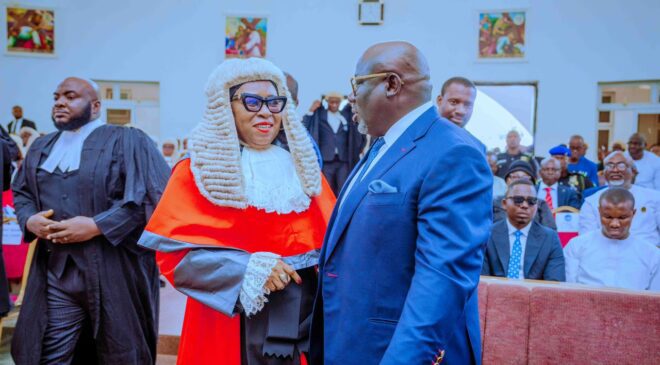
ASABA/Nigeria: Delta State Governor, Rt. Hon. Sheriff Oborevwori, has said his administration has abolished the arbitrary upward review of contract sums to promote transparency, ensure value for money, and protect public resources.
The governor made this known on Monday at a thanksgiving service to mark the opening of the 2025/2026 Legal Year of the Delta State Judiciary, held at Emmanuel the Saviour Catholic Church, Asaba.
Oborevwori said the reform aligns with his administration’s commitment under the MORE Agenda, Meaningful Development, Opportunities for All, Realistic Reforms, and Enhanced Peace and Security, aimed at entrenching good governance and fiscal discipline in the state.
“We have ended the old practice of arbitrary review of contract sums and variations after agreements have been signed,” the governor stated. “Every state contract now contains a clause that prevents such adjustments, and no contractor receives payment without a duly executed agreement. This is a major step towards transparency and responsible financial management in line with the Delta State Public Procurement Law of 2020.”
He further noted that his administration’s collaboration with the State House of Assembly has yielded landmark legislations in key sectors, including electricity and health, underscoring his commitment to deepening the rule of law and strengthening institutional accountability.
“Our efforts in justice infrastructure, procurement, and law-making reflect our belief that democracy thrives best when there is synergy among the executive, the legislature, and the judiciary,” Oborevwori added.
Taking the first reading from Isaiah 32:15–18, the governor reaffirmed his administration’s determination to sustain judicial independence, improve infrastructure across courts, and make justice delivery more efficient and accessible.
Highlighting his government’s welfare and economic reforms, Oborevwori recalled the approval of a 158 percent increase in Delta’s minimum wage in October 2024, higher than the Federal Government’s 133 percent, as a measure to motivate workers and enhance public service efficiency.
He also revealed that over ₦70 billion had been released to clear outstanding pension arrears, including a recent ₦10 billion intervention to the State Pensions Board, with an additional ₦2 billion disbursed monthly to sustain pension payments.
The governor noted that his administration had launched a Widows’ Welfare Scheme to provide free healthcare and monthly stipends to 10,000 widows across the state, describing it as a testament to the human-centered focus of the MORE Agenda.
On youth development, he listed several empowerment initiatives, including the MORE Grant Scheme, MORE WISE-Up, MORE ICT, and MORE Biz-Up, which he said are helping thousands of young entrepreneurs, artisans, and small business owners to become self-reliant.
Looking ahead, Oborevwori assured that his government would continue to invest in judicial infrastructure and technology through the deployment of automatic recording systems, e-filing, e-payment, and virtual hearing facilities across the state’s courts.
He urged all arms of government to work in harmony to strengthen the pursuit of justice and fairness, stressing that peace and progress can only thrive where the rule of law prevails.
“The executive, legislature, and judiciary are partners in service. Each arm depends on the other to function effectively,” he said. “Together, we must uphold the rule of law and ensure that every Deltan can live, work, and dream in a society governed by justice and fairness.”
In his homily, the Bishop of Issele-Uku Catholic Diocese, Most Rev. Michael Elue, charged members of the judiciary to discharge their duties with integrity, courage, and the fear of God, describing judges as “partners with God in the administration of justice.”
The event attracted top government officials, members of the bench and bar, traditional rulers, and other dignitaries from across Delta State.
